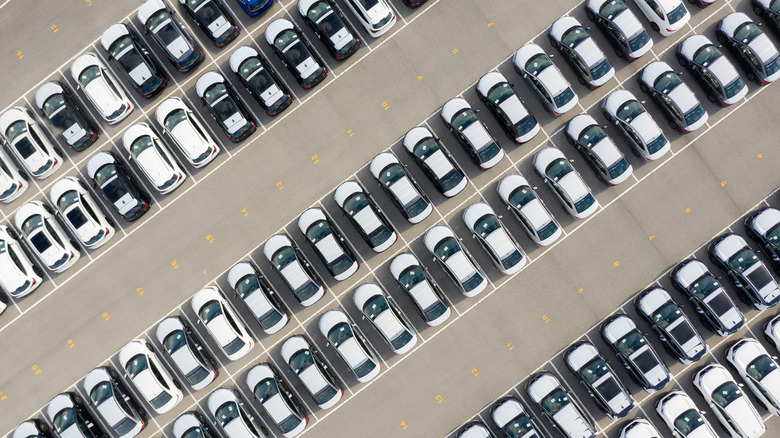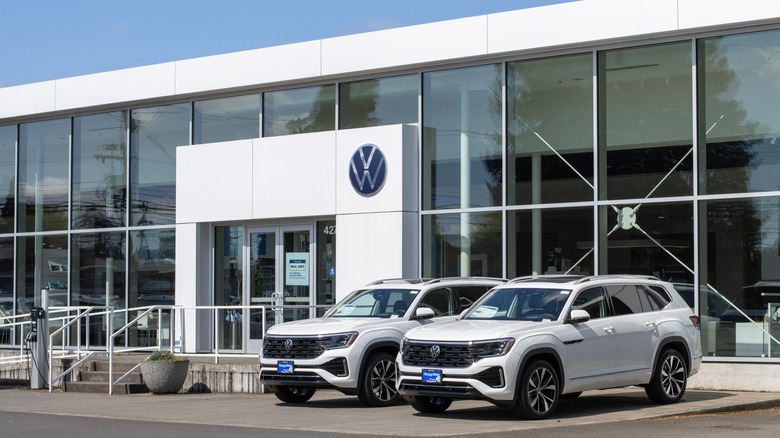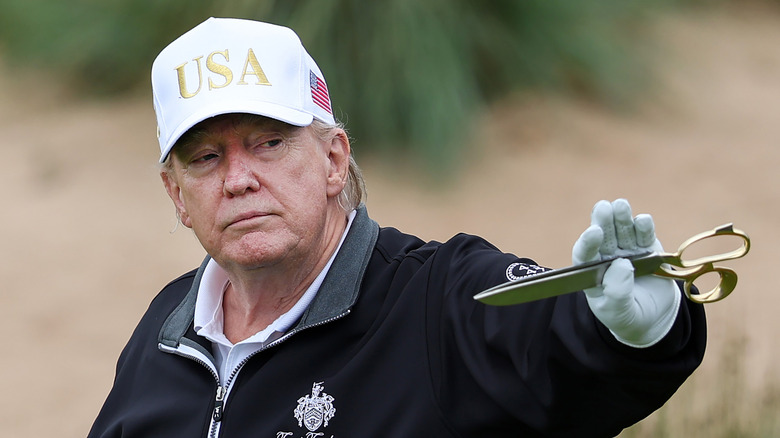Donald Trump's Tariffs Are Costing This German Car Brand $1.5 Billion
Volkswagen executives blamed tariffs for the company's declining profits — down €1.3 billion euros, or $1.5 billion, in the first half of 2025, per Reuters. Plus, top executive expect it to get much worse. Volkswagen Group CEO Oliver Blume said the company will have to speed up its efforts to adapt to tariffs. "After all," Blume told investors, per Reuters, "we cannot assume that the tariff situation is only temporary."
Thanks to tariffs, the Volkswagen Group projects that its 2025 sales will flatline in when compared to 2024, instead of going up 5% as previously projected. Volkswagen also now anticipates making a profit of between 4% and 5% by the end of 2025, which is lower than its previously anticipated profit margin of up to 6.5%. The reason for the cut in future profit optimism is that Volkswagen Group's financial reports revealed that its Q2 2025 earnings before taxes fell 32.9%, or about €1.63 billion ($1.88 billion), from 2024. After taxes, earnings plummeted further — 36.3%, or approximately €1.31 billion ($1.51 billion). While sales deliveries increased 1.5% globally, they headed downward in the U.S. by 10%, per Reuters. Plus, Volkswagen reported earning 3% less in sales revenues in Q2 then the same period in previous years.
U.S. tariffs and European car companies
Volkswagen is not the only car company dealing with tariffs launched by the Trump administration. U.S. tariffs have hit Mercedes-Benz hard, with the company reporting a 9% slump in car sales and a 26% decline in van sales globally in Q2 2025, compared to 2024. Also, several U.S. car makers are similarly concerned about tariffs in 2025, due to their possible effects on supply chains and manufacturing outside of the U.S.
With that said, European automakers have been bolstered by the late-July deal between the European Union and the Trump Administration that settled tariffs at 15% — instead of the 30% hike he previously threatened to implement. As these tariffs fall to 15%, Volkswagen can expect profits to fall somewhere within its middle-projected range, said Arno Antlitz, Volkswagen's financial chief, per Reuters, but he warned, "the longer we go into the second half of the year, the more we tend to the lower end of the guidance."
Understanding Trump's tariff plan
Tariffs are a tax on foreign goods that serve two purposes: raising revenue and encouraging U.S.-based manufacturing. In terms of revenue, the federal government has collected $150 billion from tariffs so far in 2025, per Fox Business, with about $28 billion of that amount gathered in July 2025 alone. With that said, automakers are expected to pass on 80% of the cost of these tariffs to consumers, which will increase the average price per vehicle by an average of $1,760, consulting firm AlixPartners told Bloomberg. Nevertheless, President Donald Trump made his opinion on car prices clear when he told NBC in March 2025 that he "couldn't care less if [foreign car companies] raise prices, because people are going to start buying American-made cars." He added that the tariff plan is meant to encourage car companies to manufacture in the United States.
Volkswagen may have received the message. Dusseldorf-based business newspaper, Handelsblatt, reported in January 2025 that the company considered manufacturing Audi and Porsche brand vehicles at its plant in Chattanooga, Tennessee as a means of avoiding tariffs in the U.S. Currently, the Chattanooga plant produces the Volkswagen ID 4 electric SUV as well as the gas-powered Atlas and Atlas Cross Sport. Still, not all of Volkswagen's economic woes can be blamed on tariffs. The European car industry is also dealing with increased competition from China, which aims to bump up production of electric vehicles.


